




 |
 |
 |
 |
 |
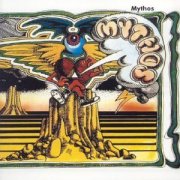 |
Mythos (1972, 38.55) ***/TMythoettOriental Journey Hero's Death Encyclopedia Terra part 1 Encyclopedia Terra part 2 |
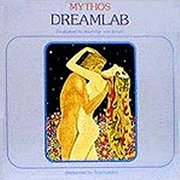 |
Dreamlab (1975, 40.58) ***½/TDedicated to Werner von BraunMessage Part I Part II Expeditions Mythalgia Dreamlab Echophase Quite Amazed Going to Meet My Lady Eternity |
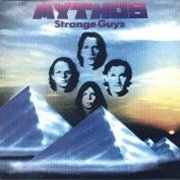 |
Strange Guys (1977, 41.52) ***/0AeronautStrange Guys Mysterious Scene Powerslide Terra Incognita Backstage Fumble |
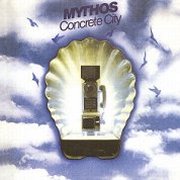 |
Concrete City (1978, 34.35) ***/0Harry ChancelessConcrete City Flamenco Bay Neutron Bomb Ulysses B. Smart Yukon |
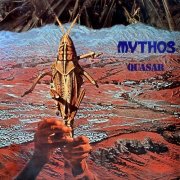 |
Quasar (1980, 33.59) ***/0 |
|
| Quasar Nurse Robot Flut-e-Quenzer: the Knight Duel Lamentation Conjuration Rebirth Flut-e-Sizer Didn't Notice, Didn't Mind |
Nothing But Your Dream Just a Part When the Show's Just Begun |
|
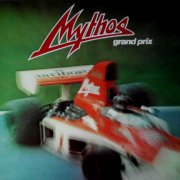 |
Grand Prix (1981, 32.24/43.38) ***½/0 (T) |
|
| Grand Prix Transamazonica Transatlantik Non-Stop Video Jet Set Bermuda Dreieck Robot Secret Agents Mayday |
[CD adds: Rockwärts Mellotron Mystique] |
|
Current availability:
Mellotrons used:
I've obtained these five Mythos albums in reverse order, so, given that they deteriorated as they went along, it's taken me until now to hear their better, earlier works. Led by flautist Stephan Kaske, they started in the early '70s with a psych/electronic crossover style, shifting into a fairly average hard rock/electronic thing by later in the decade. Their later albums are rather unfocussed, although the same can't be said for their first two records.
Mythos is yer classic full-on kraut album, full of dreamy 'eastern' interludes and trippy jamming, all produced to sound like it's being played at the bottom of a well. Actually, that's unfair - I've heard immeasurably worse productions than this from that scene, but it is a bit murky. Kaske plays Mellotron on a couple of tracks, with a few seconds of strings on Hero's Death, but full-on flutes, brass and strings on closer Encyclopedia Terra Part 2, just before the lengthy (English-language) soliloquy on eternity and suchlike. Dreamlab is a really rather good, typical German space-rock/kraut album, largely composed of drifting, acoustic guitar-based material, with spacey flute and synth passages, standing head and shoulders above the band's later work. As usual with fairly complex material, it's difficult to pinpoint highlights after one listen, although closer Eternity is quite excellent; suffice to say, if you're into the genre, you'll like it. Bassist Robby Luizaga doubles on both acoustic guitar and Mellotron, although he only plays a few string chords in Mythalgia and Eternity, hardly making this a Mellotron essential.
Strange Guys was the point at which Mythos started going downhill. It's by no means a bad record, just a little uninspired, its sound kind of hard-rock-with-synths, while the material isn't actually that good. They're better when they drop the vocals, as on three of the six tracks here, the best of which is probably opener Aeronaut. Lead guitarist Sven Dohrow is credited with 'Mellotron (strings)', but, aside from a little string synth on a couple of tracks, I can't hear a note of it, to be honest, although there are a few bits of what sounds slightly like Mellotron saxes. Hmmm. Not exactly a Mellotron album, methinks. Concrete City isn't dissimilar to Strange Guys, with some reasonable synth work and slightly better songwriting, although they were never destined to move into SFF territory. The straightforward song format is adhered to, as on its predecessor, with none of their early cosmic jamming, or later all-out electronic stuff. Once more, not a hint of anything Mellotronic, although Dohrow is supposed to play it again.
To my knowledge, Quasar was the original Mythos' penultimate album, basically, a Stephan Kaske solo project by this point. I'm afraid it's pretty weak, if truth be told; few memorable tunes and, unless he was using some really unusual sounds, despite its sleeve credit, absolutely no Mellotron to be heard anywhere (no, not even over headphones; I've tried). The album is the band's usual attempt at crossing electronic music with progressive, but really doesn't cut it in my opinion, while I really couldn't, in all conscience, recommend it to anyone much. I've given it three stars for effort and because it's not actually painful, but I'm afraid that's about the best I can say about it. Oddly, 1981's Grand Prix was something of a return to form, its material far stronger than Quasar's, at its best on the opening title track, Transatlantik Non-Stop and Robot Secret Agents, complete with Kraftwerk-alike vocoded vocals. The original album doesn't even credit Mellotron, but, given that one of the CD issue's two bonus tracks is titled Mellotron Mystique, here it is. It features a very upfront and very Mellotronic flute part, a cello line counterpointing it, while simultaneously being the best track on the disc.
I'm beginning to wonder if Mythos actually knew what a Mellotron was after 1975, or whether they had such bizarre tapes on their machine that I don't know what I'm hearing, although the Mellotron strings credit on Strange Guys would seem to give that the lie. However, I can't hear a single note of anything at all Mellotronlike on any of their later albums, so I'd have to give them a resounding 'don't bother' on the Mellotron front, although their first two have their moments. I'm not that blown away by their later music, either, but plenty of people are, so that one's up to you. Kaske kickstarted the Mythos name later on and has been producing electronic albums ever since, but I suspect the music has little in common with any of these albums, let alone their earlier material.
Kaske revived the Mythos name in the late '90s, it seems, 2015's Jules Verne Forever being something like his tenth subsequent release. I think 'ethno-electronic' might just describe this stuff: halfway between 'typical' EM and world music, perhaps a little like an updated Embryo. The only track that deviates from the formula is closer Five Weeks In A Balloon, although I can't honestly say the variety was worth it. Despite claims of Mellotron use, all I can hear are samples, with cellos on opener The Mysterious Island and a flute line (combined with synth) on Southern Star Mystery, for what it's worth.
Kaske quickly followed up with a 'sequel', Jules Verne: Around the World in 80 Minutes, replete with shoddy, badly Photoshopped sleeve design. Correct me if I'm wrong, but there aren't any sea monsters in Around the World in Eighty Days, are there? Musically, this does precisely nothing you can't hear on its predecessor, unless you're an EM obsessive, I suppose, in which case it's probably almost entirely different. Actually, to be fair, It Seems The Wager Has Been Lost does stand out, albeit largely for its irritating synth textures and programmed rhythms. The law of dimishing returns is clearly illustrated by this album; Jules Verne Forever is definitely the better release. Even less samplotron this time round, with distant choirs on Across The Atlantic Ocean and, er, distant strings on It Seems The Wager Has Been Lost.